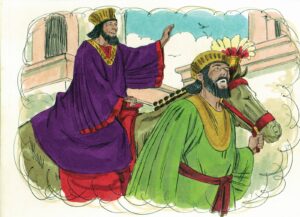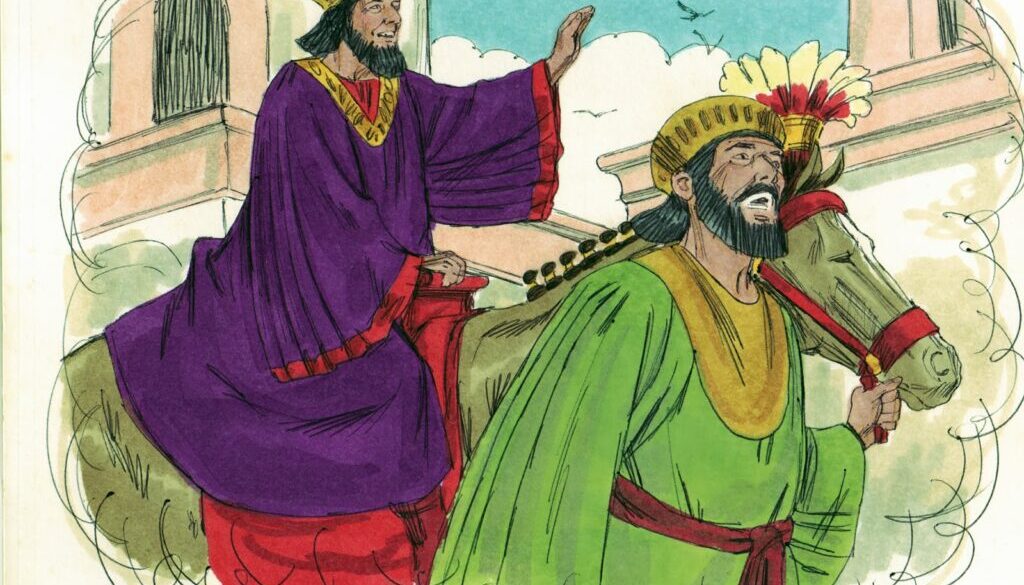Ester 6:1-13 Insomnia

The king has insomnia this night, the night following the first feast Ester prepared and the next one he is invited to. While awake he makes a discovery of great importance.
We are between Ester’s two feasts. “What is she up to” is running through the king’s mind. And he can’t sleep because of it. A little heavy reading should put him to sleep so he calls for the chronicles of his reign to be read to him.
This is also the night that Haman and his friends are busy building a gallows for the despicable Jew Mordecai. Haman plans to see him swing from it in the morning. Let’s join our story already in progress.
♥ ♦ ♥
King Ahasuerus has dispatched the last of his duties for the day. It has been a good day. But the fact that Ester still hasn’t named her request is weighing on his mind. He thoroughly trust her and has no fear that her request will hurt him but still he wonders. “What is she up to?”
Ahasuerus readies for bed, just like every other day. He washes his face, rinses his mouth, makes one last visit to his personal latrine and climbs into his bed that has already been turned down by his servant. He is ready for a good night’s sleep. He closes his eyes and begins to quiet his mind.
Hours have passed and Ahasuerus can’t seem to stop his racing mind. Every time he closes his eyes he sees Ester standing outside his throne room. She is radiant and his heart races just remembering the sight. Then his mind turns to her answer to his question. He knows she has something in mind but she is hesitant to share it. “What is she waiting for? Why won’t she just come out and tell me? What could it be that is so difficult to speak?”
More than half the night has passed and the king is unable to sleep. Finally he decides to try something else. He rises and begins walking the length of his chambers. The servants who are on guard outside his room hear him stirring.
“Is all well my king” asks the senior servant through the door.
“No, it is not. I require something to help me sleep.”
“What would my king wish as an aid?”
“Something to take my mind from the thoughts it has been visiting all night!”
“What might that be my king?”
Ahasuerus thinks for a few minutes. Finally he settles on an answer. “Bring the books of remembrance. Reading them may distract my mind and allow me to sleep. I will hear them from my throne.”
The servant quickly woke the king’s secretary and he brought the scroll with all the king’s accomplishments to his throne room. “Where would you like me to begin my lord” asked the secretary.
“Begin at the beginning. I’ll let you know when to stop.”
Hour after hour the secretary read from the chronicles of the king. He read of his building projects. He read about the campaigns he had waged, both successful and not. He read about the inventions the king had made. None of this lulled the king to sleep. He listened intently and asked clarifying questions here and there. The night had slipped into morning as the secretary read on. As the sun was rising above the hills the secretary reached a most recent entry.
“The plot against the king’s life orchestrated by Bigthana and Teresh was disclosed to the king through the hand of the man named Mordecai.”
“Wait! ‘What honor or distinction has been bestowed on Mordecai for this’ (verse 3a).”
The secretary searched a little farther before responding. “Nothing has been done for him” (verse 3b).
“This must be remedied at once. ‘Who is in the court?’ (verse 4a)”
The secretary moves to the doorway and looks out. He sees a man. “Haman is there, standing in the court” (verse 5b).
Ahasuerus nodded. “Let him come in” (verse 5c).
All during the night while the king struggled with sleep and when he listened intently to the chronicles of his reign, Haman had been busy. He had been overseeing the construction of a gallows. This gallows was designed with one man in mind; Mordecai the Jew. Haman was determined to see him swinging from it this very day. He came as early as possible to meet with the king so he could discharge the deepest need of his soul. He stood in the courtyard waiting, from the moment the sun had peeked over the horizon.
The secretary emerged from the king’s throne room and called out to Haman. “The king desires to see you.”
Haman was excited! The king actually wanted to see him instead of him having to beg for an audience. “This is a good omen” thought Haman as he enters the throne room and stops before his king. Haman bows low to the king in respect and Ahasuerus begins speaking even before Haman has fully stood.
“What should be done to the man whom the king delights to honor?” (verse 6b) asks Ahasuerus.
Haman is beside himself with joy, but he contains it as best as he can. It would not do to show the king how his words excite him. After all, who but himself would the king choose to honor? Clearing his throat and with eyes gleaming in anticipation, Haman speaks of exactly what he wants the king to do for him. Exactly how he wishes to be treated as the most honored man in all the kingdom, save the king.
“For the man whom the king delights to honor, let royal robes be brought, with the king has worn, and the horse that the king has ridden, and on whose head a royal crown is set. And let the robes and horse be handed over to tone of the king’s most noble officials. Let them dress the man whom the king delights to honor, and let them lead him on the horse through the square of the city, proclaiming before him: ‘Thus shall it be done to the man whom the king delights to honor’” (verses 7-9).
Ahasuerus nods his head and claps his hands together. “Good! ‘Hurry; take the robes and the horse, as you have said, and do so to Mordecai the Jew, who sits at the king’s gate. Leave out nothing that you have mentioned’ (verse 10).”
It is all Haman can do to keep from falling to his knees and weeping or crying out. Mordecai, of ALL the people in the kingdom, is most despised by Haman. “The king has no idea what he is asking of me” he cries out within his heart. But there is no taking back his words or changing the king’s mind. The only recourse he has is to do exactly as he had laid out for the king. “It shall be as you command my king” answers Haman before he turns and stiffly walks from the throne room.
Haman calls the king’s personal servant. “Go and retrieve one of the robes the king has worn for we are to honor…” Haman clenches his teeth on his next word “…Mordecai.”
The servant gives him a funny look but does as he is bid. Haman then calls for the king’s groom to bring out the king’s own horse, saddled and ready to be led. When all these pieces are assembled, Haman moves to the king’s gate where Mordecai has already taken his place for the day.
With his head held high, Haman approaches and speaks to Mordecai. He is half hoping that the old Jew refuse him and thus anger the king in the process. “Come with me.”
Mordecai looks at Haman with suspicion as he rises from his seat. He knows of Haman’s hatred and suspects that this is a way to get him into trouble with the king. Mordecai follows Haman from a few paces behind into the courtyard where the two servants wait. He sees the servant holding the king’s robe over his arm and the other holding the reins of the king’s horse.
Haman walks up to the servant holding the robe and lifts it from his arm. He rubs the rich material between his fingers. How he wishes this robe were being placed on him instead of this rebellious Jew. But he has no other options. He turns and begins to dress Mordecai in the king’s robe. Mordecai’s eyes open wide but his mouth remains firmly shut.
Once Mordecai is dressed Haman leads him to stand beside the king’s horse. “Help him mount it” he orders the groom.
The groom quickly assists Mordecai in settling into the king’s saddle. A hint of a smile plays at the corners of Mordecai’s mouth. He still doesn’t know what is going on but things seem to be looking up for him.
After Mordecai is firmly seated upon the king’s horse, Haman takes the lead from the groom and begins to lead the horse from the palace. As soon as they pass the threshold of the king’s gate Haman begins to cry out his message to the people. “Thus shall it be done to the man whom the king delights to honor” (verse 11b).
Mordecai’s smile now covers his face. It is all he can do not to laugh out loud at the turn of events, but he will hold his tongue and let Ester do her work. He simply waves at the people as they pass.
Haman wants this task over as SOON as possible so he walks with haste. He cries out his same announcement in every street and at every corner. Haman is led atop the king’s horse and wearing the king’s robes through the square of the city. All heads turn at the sound of Haman’s cry and all eyes take in the two men and their positions. Haman’s face burned red as he performed the acts that the king directed. He hoped the people took his coloring as a sign of exertion instead of the shame he was feeling, mixed with seething hatred of the man he was pouring glory upon.
Finally reaching the safety of the palace once again, Haman led the king’s horse through the king’s gate and handed the reins to the groom. Without another word he turned and hurried back out into the streets and made his way home. He covered his head with his hands as he made his way home.
Mordecai, meanwhile, removed the robe of the king and handed it back to the servant. Then he returned to his place at the king’s gate. He knew of Ester’s plan. This was the day she would act on behalf of her people. He sat, silently praying, and waited.
In the palace, the day was unfolding with care. Ester was preparing her feast while Ahasuerus conducted the business of the morning. He wanted all the affairs to be discharged before joining Haman for Ester’s feast. This also kept his mind off what her request might be.
The time for the feast was quickly approaching but Haman was so distraught that he kept no record of it. After hurrying home he had found his friends and wife there to meet him. They had no cheerful greetings. They had heard his announcements and seen him as he led Mordecai through the square.
Zeresh, Haman’s ever wise wife spoke for the group who stood before him. “If Mordecai, before whom you have begun to fall, is of the Jewish people, you will not overcome him but will surely fall before him” (verse 13b).
“How can you say this” Haman cried with anguish in his eyes.
“Your wife speaks wisely. Remember the stories of these people.”
(to be continued)
♥ ♦ ♥
I LOVE this point in the story. God is FAITHFUL! If not for the king’s sleepless night, Haman would have come into the courts and had his murderous plan fulfilled. If the king had honored Mordecai at the time of the incident, no more honor would be due him. If Haman weren’t the first man in the courtyard that morning, he wouldn’t have been the one calling out honor for Mordecai. ALL these pieces had to fall into place at just the right time. Talk about the fingerprints of God!
But I had a question in the beginning of our study that has stayed with me all along. It is finally time to ask it. If Mordecai had been like any of the other men who lost their daughters to the king’s haram in the beginning, would Haman even have noticed the Jews and been a threat to them?
Mordecai came EVERY DAY to the palace, from the day that Ester was taken. No other fathers did. He hung around the king’s gate every day. This is where he and Haman crossed paths. But Haman didn’t even notice him until the king’s servants brought him to Haman’s attention.
Haman was so consumed with himself that he expected everyone to be falling to the ground around him. It was, after all, the king’s command. He didn’t pay attention to the people as he passed. Until that fateful day when the king’s servants asked him why Mordecai didn’t bow down, and told him of Mordecai’s answer; because he was a Jew. After that Haman began to look for Mordecai. He began to notice Mordecai’s attitude. He probably even began to notice other Jews who were not bowing down. And his hatred grew with each slight.
So if Mordecai had been like any other man, would the Jews have even been in danger?
I’ve thought hard on this question, as you can see. As I was thinking about it I also remembered the event that the king was reminded of that night. If Mordecai hadn’t have become ‘a fixture’ in the courtyard the two eunuchs wouldn’t have been talking in his presence and the plot might never have been discovered, or been discovered too late to stop it. God put Mordecai in place to save the king. And the king would eventually save Mordecai. You can’t have one without the other.
God KNOWS what our future holds and He has been preparing us for it from the moment we arrived in this world! Not every step is glamorous, but it is important. Without all the lessons we wouldn’t be who we are today. I know a LOT of lessons I would have preferred not to learn ‘the hard way’ but they wouldn’t have stuck any other way. The final result will be well worth all the hard places!
Father God, thank You that You are in control of my life. I shudder to think where I would be if I were orchestrating my life on my own. How many times I would have run aground because I was DETERMINED to go MY way. How many blessings would I have missed out on if I skipped over all the hard places? Mordecai would have missed out on this morning’s ride if he had stayed home. Remind me of this every time I complain about the hard things in life. You are my anchor in every storm and my Anchor holds!



